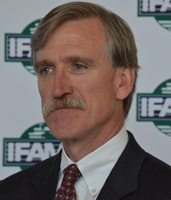 Food security was the topic for an address last week to the International Food and Agribusiness Management Association (IFAMA) World Forum by DuPont Executive Vice President Jim Borel.
Food security was the topic for an address last week to the International Food and Agribusiness Management Association (IFAMA) World Forum by DuPont Executive Vice President Jim Borel.
“We need a new generation of food visionaries who can see the tremendous opportunity made possible by the simple fact that people have to eat,” Borel told the group of more than 450 attendees during his address.
The DuPont executive talked about the need for local solutions, information transfer, sustainability in a broad sense, and collaboration. His best quote was about technology. “There’s more technology in a kernel of seed corn than there is in an iPhone,” and even more than that, there’s more hope to feed the world.
After his talk, I had a chance to interview Mr. Borel and I asked him about one issue that he did not touch on during his address – how agriculture can produce both food and fuel and how biofuels have been blamed for food shortages in the world. “This is an important debate,” he said. “First of all, food security and energy security and sustainability are both important issues and each country and government need to come up with the policies and approaches that work best for them.”
Borel believes that at this point, grain-based ethanol production has pretty much reached a peak in the United States. “I think the growth in biofuels production is largely going to be coming from cellulosic sources,” he said. “Our activity in DuPont through our industrial biosciences business is we’re working on enzymes that can help the grain ethanol producers be even more efficient at getting more ethanol out of every bushel of corn.”
He adds that they are working on the next generation of biofuels. “We just broke ground last fall on a commercial scale demonstration facility in Iowa … to take corn stover and convert is to ethanol,” said Borel. “It’s using an agricultural waste to produce something of real value.”
Interview with DuPont Exec Jim Borel
